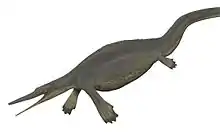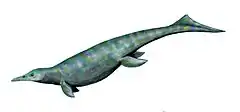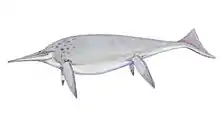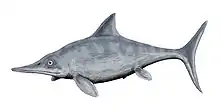Athabascasaurus
Athabascasaurus is an extinct genus of platypterygiine ophthalmosaurid ichthyosaur known from Alberta, Canada.[1][2]
| Athabascasaurus | |
|---|---|
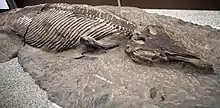 | |
| Holotype specimen in Royal Tyrrell Museum of Palaeontology | |
| Scientific classification | |
| Kingdom: | Animalia |
| Phylum: | Chordata |
| Class: | Reptilia |
| Order: | †Ichthyosauria |
| Family: | †Ophthalmosauridae |
| Subfamily: | †Platypterygiinae |
| Genus: | †Athabascasaurus Druckenmiller & Maxwell, 2010 |
| Species: | †A. bitumineus |
| Binomial name | |
| †Athabascasaurus bitumineus Druckenmiller & Maxwell, 2010 | |
Discovery
Athabascasaurus is known from the holotype TMP 2000.29.01, articulated nearly complete postcranial skeleton and nearly complete skull preserved in dorsal view, missing the premaxilla. It was collected in 2000 on the western side of the Syncrude Canada Ltd.'s Base Mine, an open-pit mine near Fort McMurray. The specimen was found in the Wabiskaw Member of the Clearwater Formation, which dates to the earliest Albian stage of the Early Cretaceous epoch, about 112 million years ago.[1] The specimen resides at the Royal Tyrrell Museum of Palaeontology.[3]
Athabascasaurus was first named by Patrick S. Druckenmiller and Erin E. Maxwell in 2010 and the type species is Athabascasaurus bitumineus. The generic name is derived from the name of the Athabasca River, which runs through Athabasca oil sands area where the holotype was collected, and sauros, Greek for "lizard". The specific name refers to the fact that it was recovered at an oilsand mine.[1]
Classification
Recent cladistic analyses found it to be most closely related to "Platypterygius" australis, and to nest within Platypterygiinae.[4][5]
References
- Patrick S. Druckenmiller & Erin E. Maxwell (2010). "A new Lower Cretaceous (lower Albian) ichthyosaur genus from the Clearwater Formation, Alberta, Canada". Canadian Journal of Earth Sciences. 47 (8): 1037–1053. Bibcode:2010CaJES..47.1037D. doi:10.1139/E10-028.
- "†Athabascasaurus Druckenmiller and Maxwell 2010". Paleobiology Database. Fossilworks. Retrieved 21 July 2017.
- Henderson, D. (2013). "A one-in-a-billion dinosaur find". The Guardian. Retrieved 2013-11-21.
- Fischer, Valentin; Edwige Masure; Maxim S. Arkhangelsky; Pascal Godefroit (2011). "A new Barremian (Early Cretaceous) ichthyosaur from western Russia". Journal of Vertebrate Paleontology. 31 (5): 1010–1025. doi:10.1080/02724634.2011.595464. S2CID 86036325.
- Valentin Fischer; Michael W. Maisch; Darren Naish; Ralf Kosma; Jeff Liston; Ulrich Joger; Fritz J. Krüger; Judith Pardo Pérez; Jessica Tainsh; Robert M. Appleby (2012). "New ophthalmosaurid ichthyosaurs from the European Lower Cretaceous demonstrate extensive ichthyosaur survival across the Jurassic–Cretaceous boundary". PLOS ONE. 7 (1): e29234. Bibcode:2012PLoSO...729234F. doi:10.1371/journal.pone.0029234. PMC 3250416. PMID 22235274.
